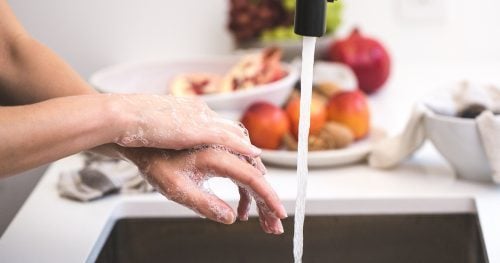BLOGS
Prevent the Spread of COVID-19 in your home

As the coronavirus pandemic spreads around the world, it’s a good time to understand how cleaning can help prevent the spread of disease and what you can do to cut the risk of infection in your home.
COVID-19 is a delicate structure and it is vulnerable in the environment. Both heat and detergents, including soap, can stop it functioning.
Contaminated surfaces
If a surface becomes contaminated or you think it could be, cleaning it with a common household disinfectant will kill the virus. Remember to wash your hands after cleaning (or use an alcohol-based hand rub) and avoid touching your eyes, mouth or nose.
There are many options for what to use to clean, including paper towels, cloths or disposable wipes. If you are reusing a cloth, remember to wash it afterwards and let it dry. Laundering cloths in the washing machine with normal washing liquid is also likely to kill the virus, particularly on a hot wash.
Dishes and cutlery
Washing with hot water and detergent is fine for dishes and cutlery. A dishwasher is even better, because it can use hotter water than your hands will tolerate.
Clothing and linen
Wear disposable gloves when handling dirty laundry from an ill person and then discard after each use. If using reusable gloves, those gloves should be dedicated for cleaning and disinfection of surfaces for COVID-19 and should not be used for other household purposes. Clean hands immediately after gloves are removed.
If no gloves are used when handling dirty laundry, be sure to wash hands afterwards.
If possible, do not shake dirty laundry. This will minimize the possibility of dispersing virus through the air.
Clean and disinfect clothes hampers according to guidance above for surfaces. If possible, consider placing a bag liner that is either disposable (can be thrown away) or can be laundered.
Laundry from someone who is sick can be washed with other people’s items.
And remember to wash your hands immediately after touching any contaminated laundry.
Prevention is best. Remember that surfaces play a role in transmitting pathogens, so preventing them from becoming contaminated in the first place is as important as cleaning. There are some things you can do to reduce the amount of contamination of surfaces in your house:
• Cover your cough and sneezes, ideally with a tissue but otherwise into your elbow, and wash your hands immediately.
• Wash your hands often, especially after going to the bathroom and before eating.
Source: Centers for Disease Control and Prevention • The Conversation
Update: The developments in the COVID-19 booster shots













